Henry Kissinger, former secretary of state who shaped decades of U.S. policy, dies at 100
- Oops!Something went wrong.Please try again later.
- Oops!Something went wrong.Please try again later.
Henry Kissinger, the toweringly influential former secretary of state who earned a reputation as a sagacious diplomat but drew international condemnation and accusations of war crimes for his key role in widening the American presence in Vietnam and the U.S. bombing of Cambodia, died Wednesday.
He was 100.
Kissinger's consulting firm announced his death, saying he died at his home in Connecticut. No cause was given.
Kissinger, a Jewish refugee from Nazi Germany, reached the pinnacle of the American political establishment and in turn became an unlikely household name. He was secretary of state and national security adviser under two Republican presidents, Richard Nixon and Gerald Ford, and advised powerful leaders in both American political parties for decades.
He came to be seen as one of the leading diplomats and international relations intellectuals of the 20th century, an exponent of “realpolitik” who orchestrated the normalization of relations with China and helped ease tensions between the U.S. and the then-Soviet Union.

Kissinger won the Nobel Peace Prize for negotiating the settlement that ended the Vietnam War, jointly receiving the award with Le Duc Tho of North Vietnam, who refused the honor. Kissinger helped open diplomatic relations between the U.S. and China during the Nixon administration in the early 1970s.
But he was also one of the most singularly reviled public figures of his age, one whose legacy is inextricably bound up with bloodshed around the world. In the eyes of his critics, he was synonymous with the brutality of American power and some of the costliest foreign policy decisions in modern history.
Kissinger’s detractors denounced him for the central role he played in expanding U.S. military involvement in Vietnam, bringing a wide-scale bombing campaign to Cambodia and supporting brutal regimes in Argentina, Chile, Indonesia and Pakistan. His most vociferous opponents labeled him a war criminal, and some called on him to face charges at the Hague.
In academia and politics, Kissinger strove to “project the myth of being a no-nonsense, half-European realpolitiker capable of explaining to naive America how to behave on the international stage,” according to Mario Del Pero, who wrote the 2009 book “The Eccentric Realist: Henry Kissinger and the Shaping of American Foreign Policy.”
Kissinger’s worldview revolved around “great power competition” — the idea that decisions made by the U.S., its allies and rivals are generally motivated by their national interests, rather than concerns about others or even accepted moral norms.
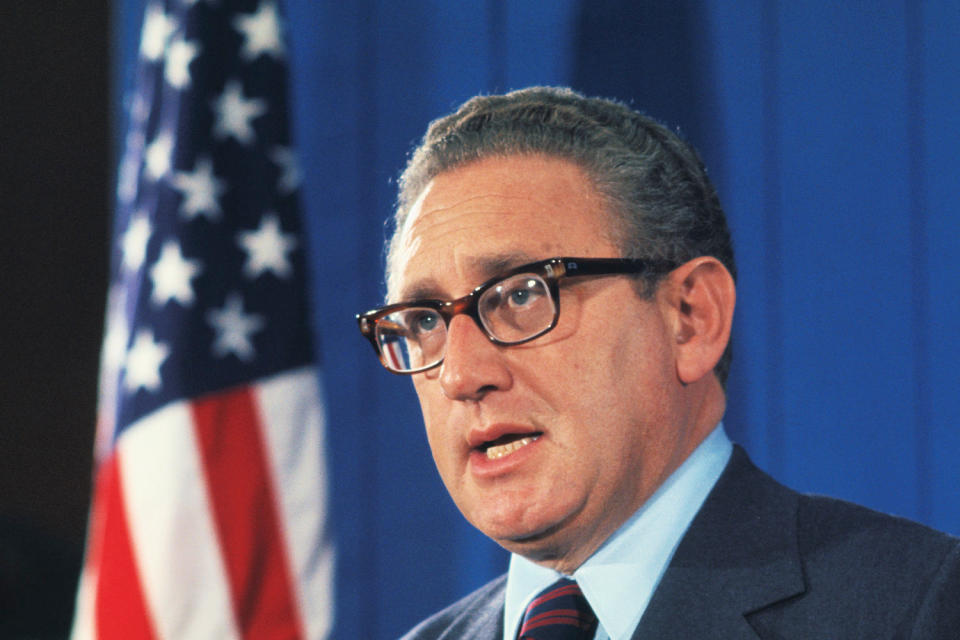
That “dark narrative” gains traction “in the U.S. during times of great crisis and difficulty,” such as the 1970s and today — rather than during the post-Cold War Western optimism of the 1990s, said Del Pero, who is an international history professor at SciencesPo, a university in Paris.
Kissinger achieved a level of national celebrity rare for a member of a president's Cabinet. He appeared on magazine covers and newspaper front pages. In the summer of 1971, when word of his secret meetings with North Vietnamese negotiators broke, Time magazine wrote that “he enjoys a global spotlight and an influence that most professors only read about in their libraries.”
He received several awards, including the Presidential Medal of Freedom (1977), the nation’s highest civilian honor, and the Medal of Liberty (1986), a prize given to 10 of America’s most culturally significant foreign-born luminaries.
Kissinger’s rise
Heinz Alfred Kissinger was born to a Jewish family on May 27, 1923, in Fürth, a city in the Bavaria region of Germany. He faced intense antisemitism as a child, and in 1938 his family emigrated to the U.S. to escape Adolf Hitler’s Nazi regime.
Kissinger became a naturalized U.S. citizen on June 19, 1943. He joined the U.S. Army that year, serving as an interpreter and intelligence officer on the European front during World War II. He then entered Harvard University, earning a bachelor’s degree (1950), a master’s (1952) and a doctorate (1954).
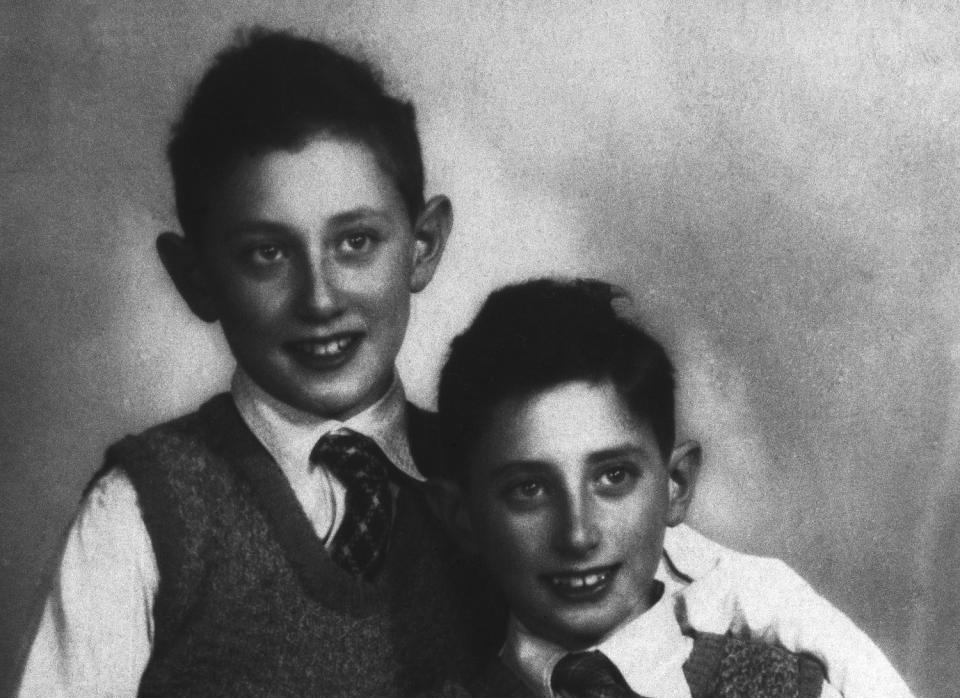
The year he received his doctorate, he joined the Harvard faculty as an instructor. He became a professor of government in 1962 and directed the university’s Defense Studies Program from 1959 to 1969.
In time, Kissinger established himself as a policy specialist whose expertise on security was tapped by the U.S. government. He served as a consultant on security to various federal agencies from 1955 to 1968, a period that spanned the presidencies of Dwight D. Eisenhower, John F. Kennedy and Lyndon B. Johnson.
Kissinger advocated for a more pragmatic approach to global conflict resolution and power relations. He was a key intellectual guiding force behind the Kennedy White House’s “flexible response” posture toward the Soviet Union, rejecting the Eisenhower administration’s policy of massive nuclear retaliation to potential communist aggression.
Kissinger reached a new level of prominence when, in 1968, President-elect Richard Nixon appointed him national security adviser. The two men inherited foreign policy crises — the war in Vietnam, mounting tensions with the Soviet Union — and sought to remake U.S. foreign policy according to their own geopolitical instincts and philosophies of power.
The height of his power
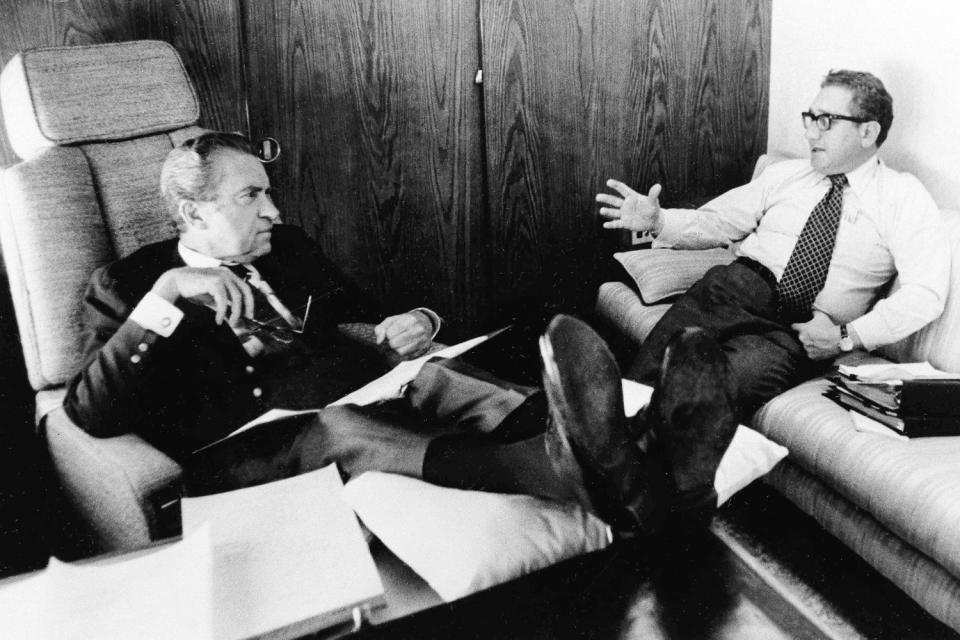
Kissinger swiftly became one of the key members of the Nixon administration, and he further rose in stature after Nixon appointed him the 56th secretary of state in the fall of 1973. In the two roles, Kissinger exercised tremendous influence over American foreign policy and the White House’s ties to other countries, allies and foes alike.But his international legacy is polarizing in the extreme: Was he America’s greatest diplomat, a brutal realist prepared to make tough calls at a time of potential Armageddon? Or a war criminal responsible for some of the darkest passages of Washington foreign policy?
Admirers tout Kissinger’s backchannel and summit diplomacy as central to achieving a détente with the Soviets, culminating in nuclear nonproliferation agreements such as the Strategic Arms Limitation Talks, or SALT 1, signed in 1972.
Meanwhile, his secretive meetings led to Nixon’s historic visit to China the same year, which supporters see as the foundation for the surge in Sino-Western relations in the decades afterward, reshaping the postwar global order.
But for critics, his name is forever linked not with China or Russia but with Cambodia, where he authorized a secret carpet-bombing campaign during the Vietnam War.
Both he and Nixon came to believe that the U.S. could not win the Vietnam War outright, instead seeking what the president famously termed “peace with honor” — U.S. troops’ withdrawing in exchange for a settlement acceptable to its allies in South Vietnam.
To that end they unleashed a dramatic escalation in the war, including an unprecedented, relentless bombing campaign on bases in neighboring Cambodia.
On Nixon’s command, Kissinger privately relayed the order for “anything that flies” to strike “anything that moves,” with the ensuing 2.7 million tons of ordnance dropped on Cambodia dwarfing even what the Allies loosed from the skies during World War II.
Many scholars believe it drove Cambodia later that decade toward a genocide killing more than 1.7 million people — more than 20% of the country’s population.
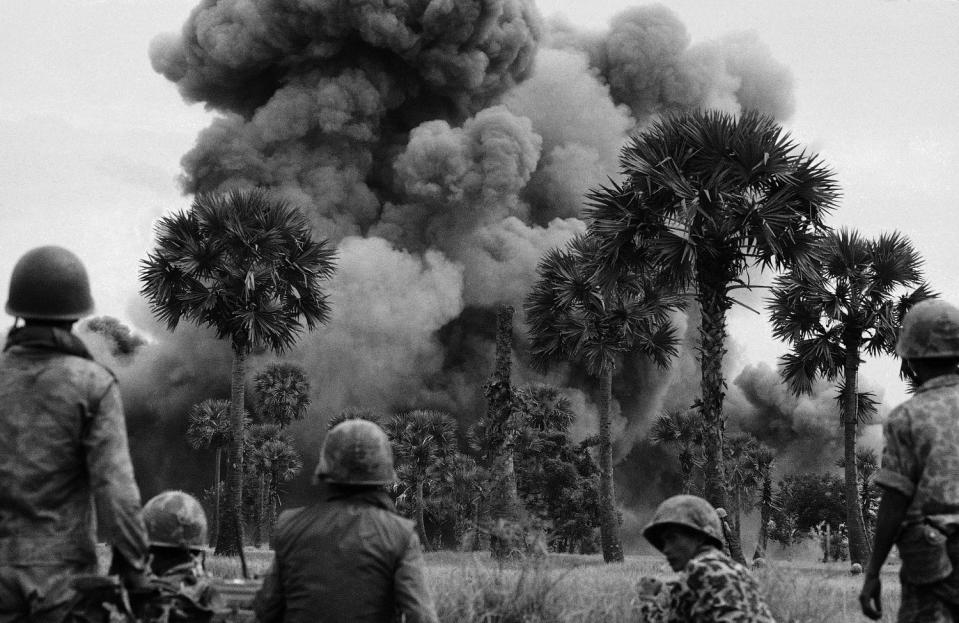
It was that act that, decades later, led Sen. Bernie Sanders, I-Vt., to describe Kissinger as “one of the most destructive secretaries of state in the modern history of this country” in a televised Democratic primary debate with former Secretary of State Hillary Clinton in February 2016.
Illustrating Kissinger’s continued divisiveness well into his 90s, Clinton had been criticized by progressives during the campaign after she called her Nixon-era predecessor a “friend” on whom she had relied for political advice.
Others went further in their criticisms.
The late author Christopher Hitchens was among those who believed Kissinger should have been prosecuted for war crimes, as he argued in the 2001 book “The Trial of Henry Kissinger.” Joseph Heller, the author of the scabrous anti-war novel “Catch-22,” memorably described Kissinger in a 1979 book as “an odious shlump who made war gladly.”
Cambodia is not the only country where Kissinger’s legacy is one of violence and chaos. He is accused of supporting Pakistan’s military regime during the Bangladesh Liberation War of 1971 and backing the Indonesian invasion of East Timor in 1975. Better known, perhaps, is his role in helping Chilean military dictator Augusto Pinochet overthrow the country’s democratically elected president, Salvador Allende, in 1973.
Kissinger feared that Allende’s “successful elected Marxist government” could create an “insidious” precedent that threatened American global power, he told Nixon in a briefing published in 2013 by the National Security Archive, a nonprofit research institute.
Watergate and beyond
Nixon was re-elected to a second term in the White House in 1972, but his presidency was soon engulfed by the Watergate scandal, which eroded his popular standing and congressional support.
Facing the threat of impeachment, Nixon decided to resign in August 1974. The night before Nixon formally submitted his resignation letter to Kissinger, the two men reportedly knelt together and prayed for peace.
Nixon left office on Aug. 9, 1974. He was succeeded by his vice president, Gerald Ford; Kissinger stayed on as Ford’s top diplomat. In the Ford years, Kissinger came under more intense criticism across the American political spectrum, and some of his key initiatives — most notably détente — started to collapse. South Vietnam fell to the Communists in 1975.
Kissinger served until the end of Ford’s term in January 1977.
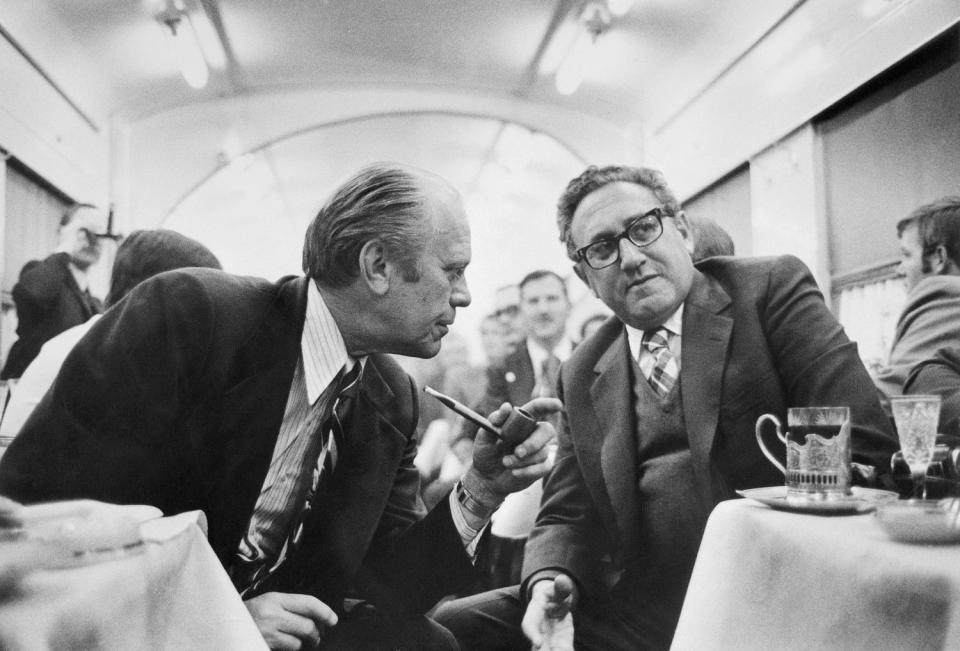
Upon leaving public service, Kissinger launched an international consulting group, Kissinger Associates, and burnished his reputation as a public intellectual, academic and media commentator. He wrote several books, including tomes on China, diplomacy, strategy and the rise of artificial intelligence.
Kissinger was accused of glossing over the facts in writing his memoirs to enhance his own reputation and role in history. For example, in reflecting on his first visit to China in 1971, he wrote that Taiwan “was only mentioned briefly,” when in fact records released decades later showed that he had offered dramatic concessions over the contentious island in the hope of earning China’s support over Vietnam.
“It’s not unfair to say that he lied” about the meeting, said James Mann, a fellow-in-residence at the Johns Hopkins School of Advanced International Studies who has written three books on China.
He also “blazed the trail” for former American foreign service officials to make money as consultants, whereas before they had largely disappeared into academic obscurity, Mann said.
“If he had merely served as an extremely powerful and in some ways innovative national security adviser and secretary of state for eight years and then left office without personalizing and commercializing his view of foreign policy, his record would stand and fall on what he did: the merits of an opening with China and détente with the Soviets versus Cambodia, Bangladesh and so on,” Mann added. “But his post-office actions, I think, leave a tremendous stain on his time in office.”
In interviews around his 100th birthday in May, Kissinger said that many world leaders — including Chinese President Xi Jinping and Russian President Vladimir Putin — would most likely answer his call were he to telephone them unscheduled.
He is survived by his wife, Nancy Maginnes Kissinger, and two children, Elizabeth and David, from his first marriage to Ann Fleischer.
This article was originally published on NBCNews.com

